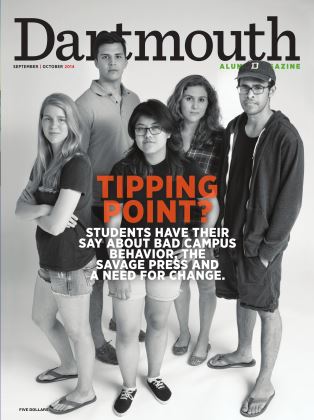PASKUS CALLS HIMSELF A "RESEARCH GEEK." THE former psychology major spends his days designing research studies and analyzing quantitative results. His subjects: the nearly half-million student-athletes who compete in college and university sports around the country.
As the principal research scientist at the National Collegiate Athletic Association, Paskus and his team publish findings that guide the policy decisions of the NCAA's member institutions. "We bring data and try to make their discussions based in real data instead of anecdote," Paskus says. The range of research questions that Paskus' team has studied match many of the general concerns in higher education (ncaa.org/about/resources/research). Recent studies have examined student-athletes' academic performance, substance abuse, rates of concussions and mental health issues. "I design a study, collect some data, write something up, and it could be in front of a committee or in policy discussions the next week," Paskus says.
At Dartmouth, adjunct professor Paula Sehnurr saw Paskus' strength in quantitative analysis. Quantitative psychology was a new field when Paskus went to work for the NCAA while he was a graduate student at the University of Virginia. Although Paskus says the field is still evolving, he sees psychological research shift- ing toward the quantitative. "We have a much bigger voice than we previ- ously did," Paskus says. "A lot of col- lege presidents and other university administrators are much more com- fortable dealing with data than they were 20 years ago, and they welcome our presence in meetings that we weren't invited to 20 vears a.£o "
TOM'S KEY FINDINGS IN RECENT NCAA RESEARCH O Student-athletes graduate at higher rates than other stu- dents at Division I schools. O Student-athletes report using drugs socially at much lower rates than other students. O Wrestling has the highest per- centage (29) of first-generation students. © 14.5 percent of head coaches are minorities. © Lacrosse is the fastest growing sport among men and women.
 View Full Issue
View Full Issue
More From This Issue
-
 FEATURE
FEATUREThe Rookie
September | October 2014 By Matthew Mosk ’92 -
 COVER STORY
COVER STORYWhat’s Going On Here?
September | October 2014 By Jennifer Wulff ’96 -
 Feature
FeatureCan Students Police Themselves?
September | October 2014 By EVA XIAO ’14 -
 Feature
FeatureOff the Beaten Path
September | October 2014 By RIANNA P. STARHEIM ’14 -
 Feature
FeatureNotebook
September | October 2014 By JOHN SHERMAN -
 Feature
FeatureClass Notes
September | October 2014 By DARTMOUTH COLLEGE LIBRARY
Gavin Huang '14
Article
-
 Article
ArticleBEQUEST FROM THE LATE WARD N. HUNT
June, 1915 -
 Article
ArticleAtlantic Odyssey
April 1943 -
 Article
ArticlePre-Princeton Party
NOVEMBER 1969 -
 Article
ArticleDartmouth Authors
June 1980 -
 Article
ArticleHanover Browsing
November 1942 By HERBERT F. WEST '22 -
 Article
ArticleA College Course for Alumni
February, 1931 By Prof. B. H. Brown


